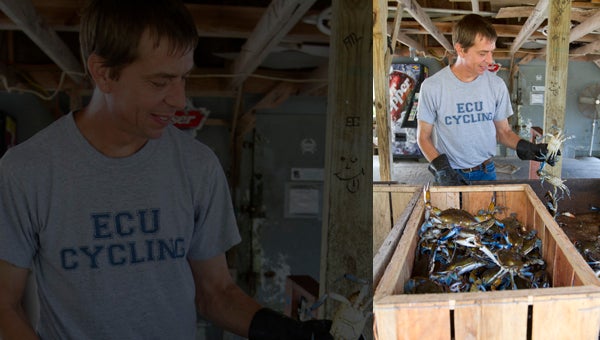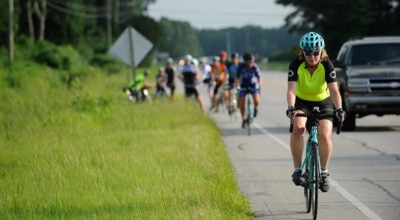Bills would affect BCCC: Commercial fishing, aquaculture courses subject of legislation
Published 7:38 pm Thursday, April 2, 2015

FILE PHOTO | DAILY NEWS
COASTAL RESOURCE: The harvesting of blue crabs, part of North Carolina’s commercial fishing industry, is an important part of the state’s economy. A bill in the N.C. General Assembly urges more coastal community colleges to offer courses in aquaculture and commercial fishing.
A bill urging community colleges in North Carolina’s coastal areas to offer courses in commercial fishing and aquaculture was referred to the N.C. House’s Committee on Education (community colleges) after the N.C. House approved its second reading earlier this week.
Late last month, Senate Bill 112 was approved on its third reading in the Senate. The bill is sponsored by Sens. Bill Cook (District 1), Norman W. Sanderson (District 2) and Jerry W. Tillman (District 29). Cook and Sanderson represent coastal counties in the Senate. Tillman represents Moore and Randolph counties.
“The legislation simply urges coastal community colleges to offer courses on commercial fishing and aquaculture,” Cook said. “Here in North Carolina, there is a significant amount of potential for the aquaculture industry to become a greater source of income and economic prosperity for North Carolina’s commercial fishing industry.”
Carteret Community College and Brunswick Community College offer aquaculture courses. Carteret Community College offers course credits that may be transferred to four-year marine-biology courses at East Carolina University or the University of North Carolina-Wilmington. Brunswick Community College’s aquaculture courses focus on freshwater aquaculture.
“For this industry to grow in North Carolina, we need to make sure our coastal community colleges are offering courses that support the aquaculture industry,” Cook said. “We North Carolinians deserve nothing less than the safest, healthiest and most delicious seafood available.”
Beaufort County Community College responded to an inquiry about its position on the bill with a written statement.
“As a participant in the economic development of its four-county service area, Beaufort County Community College recognizes the importance of commercial fishing and aquaculture in the region. Commercial fishing and aquaculture have been a part of Beaufort and surrounding counties throughout their history. Fishermen and associated businesses have profited from oysters, crabs, various finfish species, hybrid striped bass and catfish aquaculture and fish hatcheries,” reads the statement.
The statement continues with the following: “BCCC also shares the concern of Sen. Bill Cook and others about the recent declines in some of the state’s valuable fisheries resources and the businesses that depend on those resources. And, like Sen. Cook, BCCC realizes that much more could be done to help improve those resources and the businesses that depend on them.
“Based on our discussions with Sen. Cook’s office, we understand that Senate Bill 112 urges coastal community colleges to offer classes in commercial fishing and aquaculture and calls for the system office to report to the legislature any fiscal and administrative issues involved in expanding coastal fishing and aquaculture programs and recommends that coastal community colleges consider the move.
“BCCC appreciates Sen. Cook’s decision to give community colleges the chance to study the question rather than simply mandating an expansion of such programs. And we welcome the chance to be part of that discussion.”
The statement notes that the state’s community colleges are funded based on previous years’ enrollment and performance standards, so a small college like BCCC does not have the money to start new programs unless it ends a program and diverts money from it to start a new one or unless it receives outside funding such as grants to help defray the start-up costs of that program.
This year, BCCC introduced an agribusiness technology program. To have the funds to hire an instructor, purchase classroom materials and prepare adequate classroom space, the college relied on grants and diverted funds from a drafting program that it ended.
“Starting a program such as coastal fishing or aquaculture could require substantial financial resources for BCCC and classroom space, depending on the type of program,” reads the statement.
An associate-degree program in coastal fishing or aquaculture like the one cited at Carteret Community College, according to the statement, would require a substantial investment by BCCC. An Internet-based program in aquaculture offered through the Division of Continuing Education at Brunswick Community College would require less of a financial investment but most likely would involve, at the least, hiring an instructor and obtaining instructional materials for the course.
“And without outside help in paying for personnel, equipment, classroom supplies and other related costs, a small college like BCCC simply could not afford to pay for those start-up costs,” the BCCC statement reads.
BCCC contends it would need to have research in place that exhibits the availability of jobs in our service are for those who complete the program.
“However, as discussions about this continue, there may be other options open to us — such as partnering with another community college — that could enable BCCC to offer at least a part of the courses on its campus,” the statement notes.
“We look forward to exploring this and other options related to coursework in coastal fishing and aquaculture,” the statement concludes.
Another bill introduced this week also would affect BCCC if it becomes law.
State Rep. Paul Tine, whose 6th District includes part of Beaufort County, introduced House Bill 390, which would expand the number of members on BCCC’s Board of Trustees and require the N.C. Board of Community Colleges designate that all of Washington County be served by BCCC.
The bill, which passed first reading, has been referred to the House Education Committee (community colleges).






